Ihor Portnov, son of Andrii Portnov, the first presidential deputy chief of staff during Viktor Yanukovych’s era, left Ukraine in March as a volunteer and never came back. Nashi Groshi. Lviv obtained a copy of Narodna Samooborona NGO’s letter that he had used for this purpose and found that it did not contains any identifying features of this organization. Further still, it’s obvious that it visually imitates the organization with a similar name, Narodna Samooborona Lvivschyny NGO.
Here is our story about how it happened that the regional administration failed to recognized the forgery and no one has been punished yet.
***
The first to inform about Portnov’s son leaving Ukraine as a volunteer to bring the humanitarian aid and not coming back was the investigative journalism program “Skhemy” in September.
“On 22 March 2022 Lviv military administration registered Ihor Portnov in the SHLIAKH information system as a draft-age male entitled to temporary departure from the country to bring humanitarian aid for the period of one month. As indicated in SHLIAKH system, Lviv military administration made this decision about Ihor Portnov on the grounds of corresponding request from Narodna Samooborona NGO”, journalists informed.
On the following day, 23 March, Portnov Junior crossed the Ukrainian-Polish border at Krakowiec border crossing point.
Trying to justify himself, deputy head of Lviv regional military administration Yurii Buchko said that every day they receive over 200 requests from non-governmental organizations to be included into SHLIAKH information system. This means, so to speak, the daily turnover of more than 2,000 people to go and bring humanitarian aid.
Andrii Portnov himself left the country in June; however, the State Border Guard Service refuses to disclose the grounds.
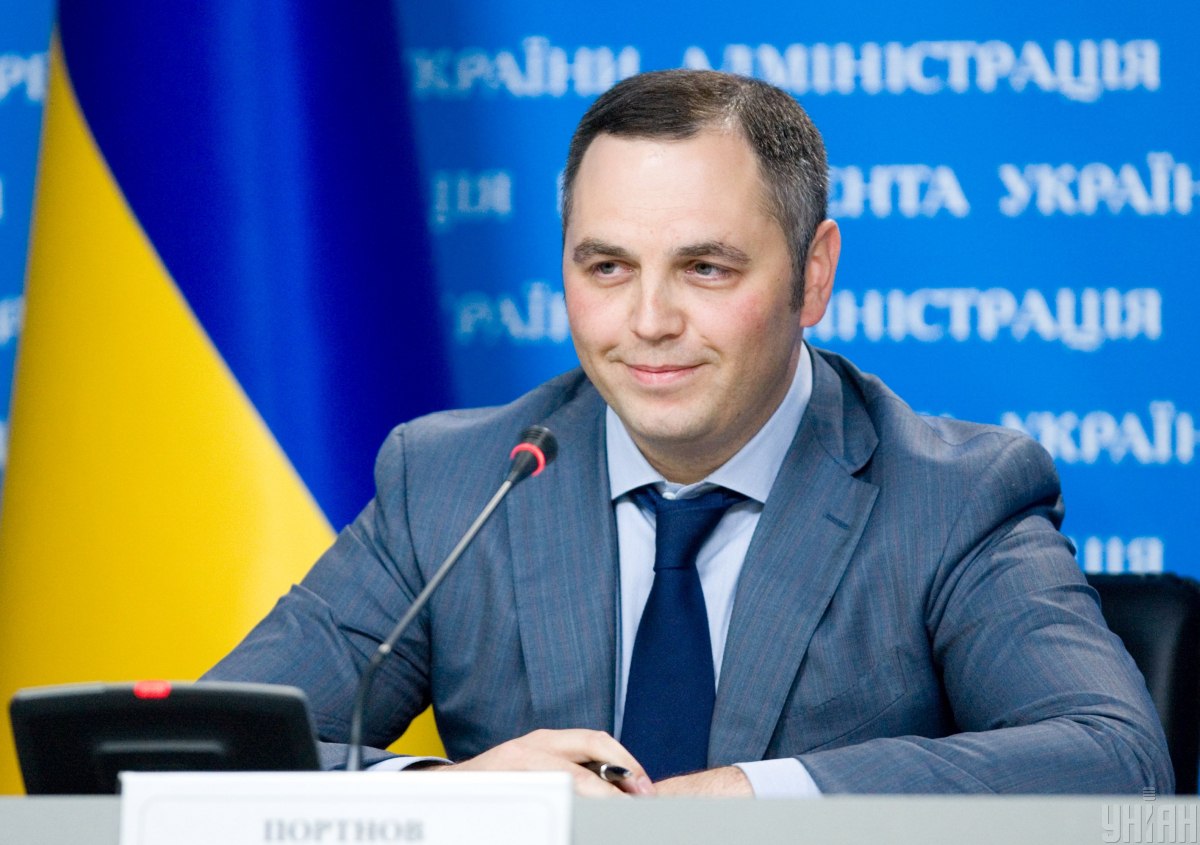
Andrii Portnov Photo by UNIAN.
“Skhemy” also requested Lviv regional military administration to provide a copy of the NGO’s application that served as a basis for including Portnov Junior into SHLIAKH information system. However, this document has never been shown to the journalists.
Therefore, making use of the law on public access to information, our editorial team sent a request to Lviv regional military administration and managed to obtain a copy of this document. In their answers to the accompanying questions the administration said the following:
“We hereby inform that as for the individual mentioned in your request, regional military administration made no decision on exemption from active duty with the suspension right and/or granting permit to leave Ukraine within the meaning of the article of the Decree of Cabinet of Ministers “Some considerations on exemption for persons subject to military service under the martial law” and Rules for crossing the state border by Ukrainian citizens approved by another decree.
Having read this answer, one can think Lviv regional military administration was not involved in Portnov’s departure; so, we reached out to Andrii Hodyk, first deputy head of the regional state administration, for comment.
When asked if it was true that Lviv regional military administration had registered Ihor Portnov in the SHLIAKH information system, he answered without slightest hesitation: “This doesn’t reflect the actual situation”.
“As of the period the request refers to, the procedure in place didn’t authorise either regional military administration or its employees to administer the SHLIAKH information system; therefore, we didn’t have any possibility to register the corresponding information in the SHLIAKH system”, said Hodyk.
He also added it was the State Border Guard Service that was making decisions back then.
“After we received a request, provided the required information was available – in particular, passport details, vehicles and contact numbers – the said information was sent to the State Border Guard Service to make a decision about leaving the country”.
Following this, we received an answer from the Ministry of Infrastructure which stated the opposite. The ministry claims that “the decision to register information about Portnov I. A. in UCUIS (Unified complex of UkrTransBezpeka information systems SHLIAKH – ed.) was made by Lviv regional military administration”.
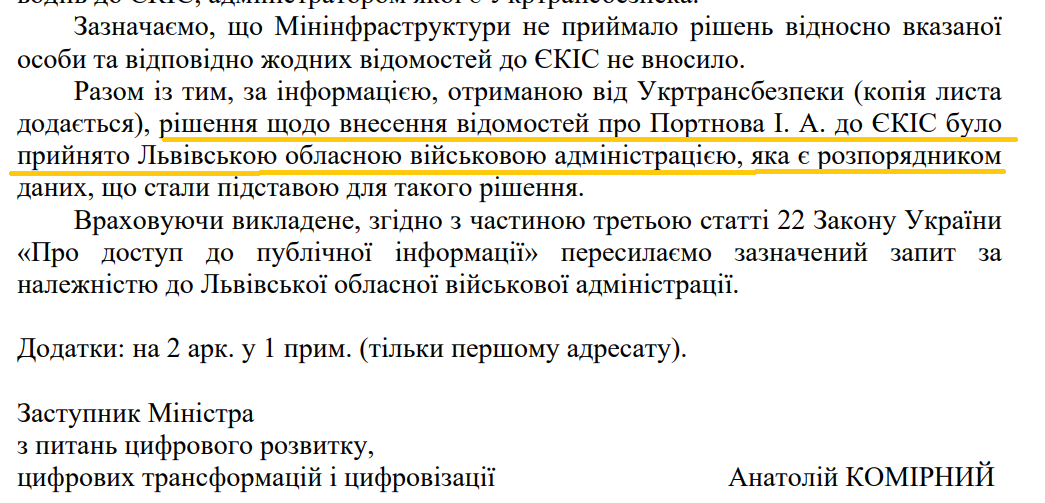
This means that Lviv regional military administration bears responsibility for letting Portnov Junior leave under the pretence of being a volunteer. We made another call to Andrii Hodyk, first deputy head of the regional state administration, asking for explanation to the Ministry of Infrastructure’s statement, but we heard again:
“The decision formalized through an order or any other executive document – we never made anything of this kind”.
Obviously, what the deputy head means is that a document issued by Lviv regional military administration and signed by any of its officials to authorize Portnov Junior’s departure does not exist. It was only in May that the administration started formalizing permits to cross the border through written orders, he explained So, if there’s no formal authorization, there’s no culprit.
A letter from nowhere
However, we still have another formal document – a letter from Narodna Samooborona NGO which served as a basis for entering Portnov Junior’s name into SHLIAKH information system. Which was accepted by Lviv officials while they could have refused to do so. We’ll tell you why.
Let’s take a closer look at the letter – just what Lviv regional military administration should have done. It contains emblem, email address, reference number, recipient, the text itself, signature and seal. The search of “Narodna Samooborona” on the register will provide almost two hundred results about various legal entities whose names contain these words. Still, a real identifier here should have been the EDRPOU [Unified State Register of Enterprises and Organisations of Ukraine] code.
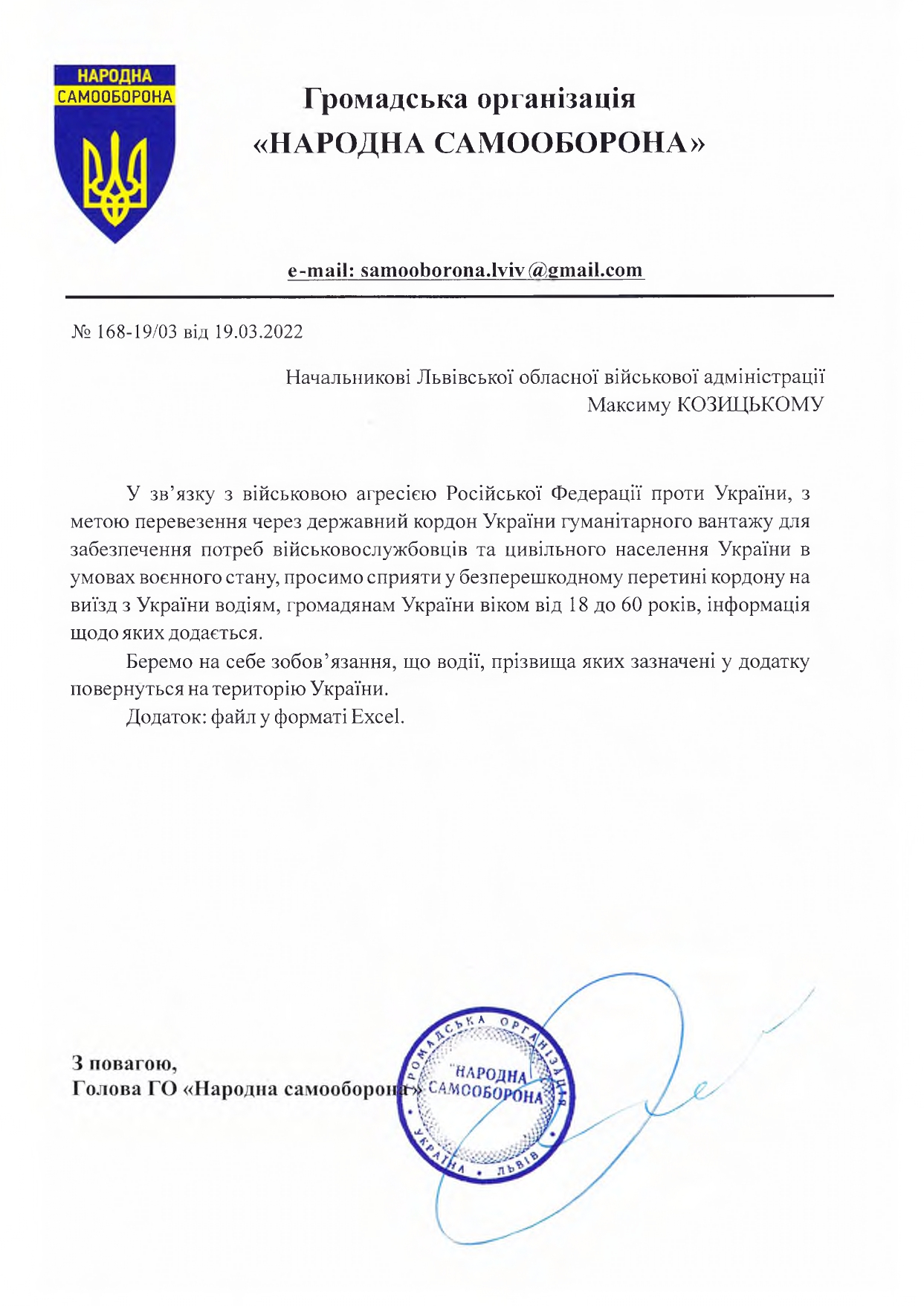

This is a unique identification number for legal entities and it is present on every seal, but not in this case. There’s the applicant’s signature next to it, but no name or surname either – just the “head of Narodna Samooborona NGO”.
Sure enough, absence of this information should have raised red flags for the employees of the regional administration. Even more, the emblem on the letter is definitely familiar. It is a copy of a well-known in the region Narodna Samooborona Lvivschyny NGO’s logo, with the only difference – name of the region had been erased.
When searching this image on Google, the first hit you get is Lviv Samooborona.
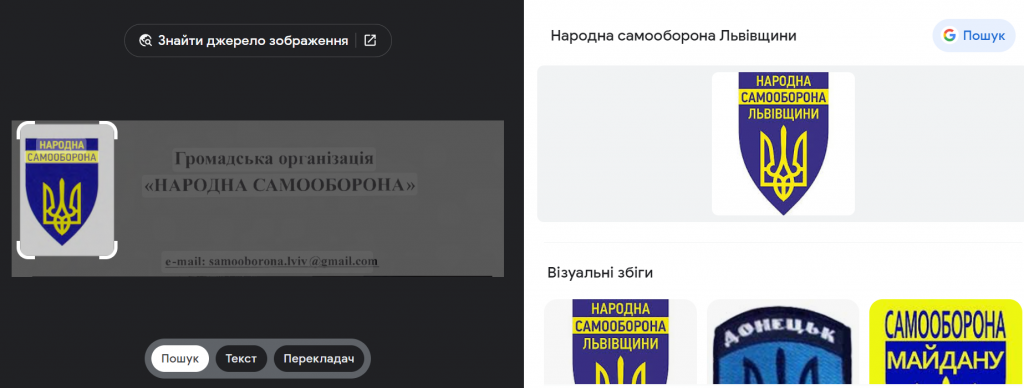
Artem Khmyz, head of Narodna Samooborona Lvivschyny NGO says his organisation never sent any letters for Portnov’s departure. He kindly agreed to give us a document with the NGO’s seal. We compared it to the seal impression on the letter to Lviv regional military administration.
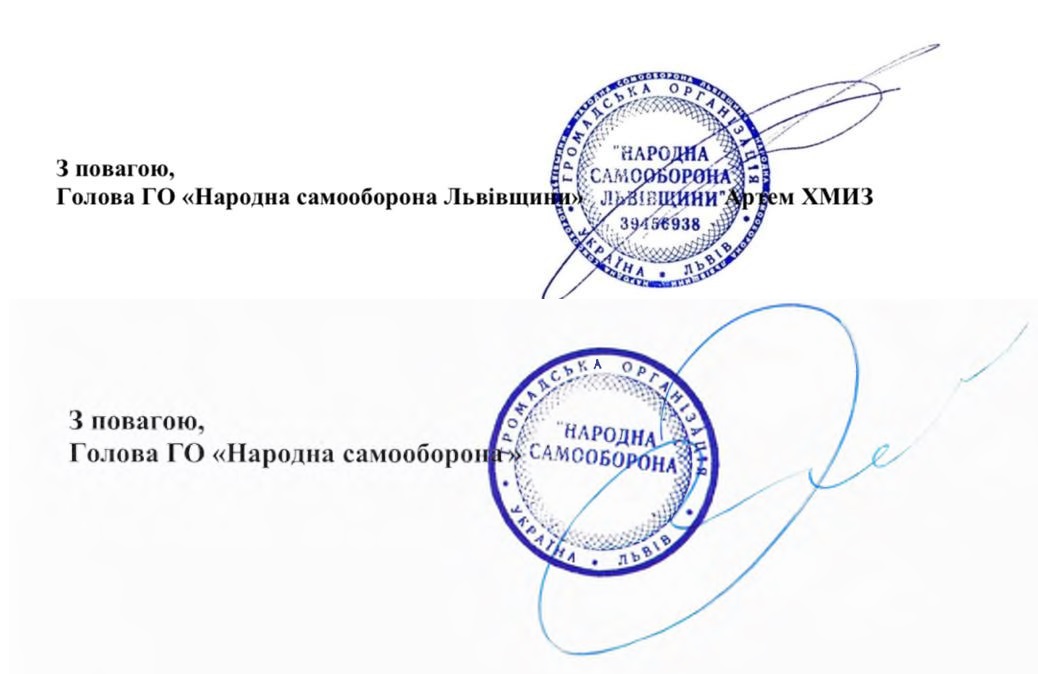
Top – original seal impression. Bottom – seal impression on the letter to Lviv regional military administration
It’s apparent to the naked eye that these two seals look very much alike. Though, one word and EDRPOU code were wiped out on one of them, and the inscription on the circle was painted out.
Finding what our seal looks like is not a problem, Artem Khmyz explained. The organization is transporting humanitarian aid, which means sending out numerous letters, which includes letters addressed to Lviv regional military administration.
Search for those who made and sent the letter now get even more complicated, as no one knows from which email address it had been sent. The source document is not available either.
“Much to our regret, we can’t show you from what email address the letter had been received. We were looking for it while preparing the response both to your request and law enforcement authorities’. Still, there’s the limited period of storing emails in our email box we receive the requests to cross the state border. Due to enormous load and huge amounts, they are stored no longer than 4-6 weeks”, reported the first deputy head of Lviv regional military administration.
As the public has no access to SHLIAKH system or Lviv regional military administration documents, there is much room for speculations how many similar counterfeits are accepted and how many ‘volunteers’ were able to leave owing to those.
No one is checking
Why did the regional administration pay no attention to the letter design? Lack of professionalism, negligence or even a crime someone profited from – there’s wide variety of options. Latest press releases of security officials revealed that registering someone’s details on SHLIAKH information system may cost as much as $ 10,000.
Still, Lviv regional military administration isn’t looking for culprits. It doesn’t say anywhere they’re supposed to check reliability of information such requests contain.
“According to the current legislation, regional military administration is not authorised to verify information contained in organisations requests’ to facilitate crossing the border by drivers subject to military service. Neither does it have capabilities and resources to control their adherence to the rules for crossing the state border or their return to Ukraine”, Lviv regional military administration said in their written response to our query.
Andrii Hodyk provided the same explanation in his comment to our editorial team.
“Neither Lviv regional military administration nor its employees can carry out expert or legal evaluation of a document or its details to identify counterfeit or anything else”.
Still, they weren’t the first who couldn’t give an answer to the question whose job it is to check reliability of information in such requests. Letters from the Ministry of Infrastructure or State Border Guard Service contain no answer either. Incidentally, the latter refused to provide us with any information about Portnov’s departure, as they are concerned about personal data protection.
Andrii Hodyk explained that prosecutor’s office contacted them regarding Ihor Portnov’s departure, but he couldn’t remember which prosecutor it was – regional, general etc.
We reached out to the regional prosecutor’s office with a list of questions about departure of Portnov and other similar cases, but they declined any comment. We received several figures as an answer to eight questions. Anyway, now we know that 92 criminal proceedings have been initiated under art. 332 of the Criminal Code of Ukraine (illegal transportation of individuals across the state border of Ukraine). 25 cases were taken to court.
Yevhen Vorobiov, lawyer with Human Rights Plarform NGO says that law enforcement authorities are supposed to start a pretrial investigation under art. 336 of the Criminal Code of Ukraine, should it turn out that the organisation’s official request contains knowingly false information, as this is treated as forgery of official documents by a public officer.
As for the liability for the volunteer not returning to Ukraine, the “maximum penalty” here is just cancellation of the decision allowing departure from the country.
“As of today, no clear criminal responsibility for the failure to return has been established yet. However, if it turns out that the documents submitted to receive a permit to leave the country had been forged and the organisation or agency disavows their request regarding this driver, law enforcement authorities can start a pretrial investigation under art. 358 of the Criminal Code of Ukraine – forgery of documents, seals, stamps and forms, sale or use of forged documents, seals or stamps”, says the lawyer.
If volunteers from certain organisation don’t come back, another investigation is possible under art. 332 of the Criminal Code of Ukraine – illegal traffic of people across the state border of Ukraine punishable by prison time between three and five years.
“In theory, if a driver doesn’t return, military administration, the Ministry of Infrastructure, UkrTransBezpeka or State Border Guard Service may contact law enforcement agencies to initiate such pretrial investigation. The law enforcement will check all the circumstances of the driver’s departure within the criminal proceedings”, explained Yevhen Vorobiov.
We don’t know whether Ihor Portnov will be held accountable for anything. We tried to contact him on the phone number that our journalist found through his profile in VKontakte, but there was no answer.
The material was prepared with the support from Internews Network. The material reflects the editorial team’s views and does not necessarily reflect the official views of Internews Network.

